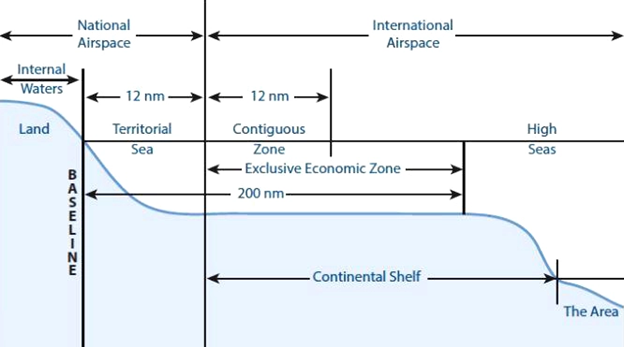Anti-Maritime Piracy Bill
Why in the News?
- The Anti-Maritime Piracy Bill, which the government claimed would give an effective legal tool to combat maritime piracy, was just enacted by the Rajya Sabha.
- More than 90% of India’s trade is conducted by maritime channels, and more than 80% of the nation’s hydrocarbon needs were met via shipping. As a result, the security of sea lines of communication is crucial.
What are the Key Features of the Bill?
- About:
- The Bill provides for prevention of maritime piracy and prosecution of persons for such piracy-related crimes.
- It will apply to all parts of the sea adjacent to and beyond the limits of the Exclusive Economic Zone of India, i.e., beyond 200 nautical miles from the coastline.
- The Bill brings into law the United Nations Convention on the Law of the Sea (UNCLOS).
- The Bill provides for prevention of maritime piracy and prosecution of persons for such piracy-related crimes.
- Definition of Piracy:
- It defines piracy as any unlawful act of assault, detention, or destruction committed by the crew or passengers of a private ship or aircraft against a ship, aircraft, person, or piece of property, for private gain. Such activities are permissible anywhere outside of India’s territorial jurisdiction, even on the high seas (outside its Exclusive Economic Zone).
- Such actions would also be considered piracy if they are purposefully encouraged or facilitated.
- It also encompasses any other behaviour that international law deems to be piracy.
- Pirate activity also involves voluntarily helping run a pirate ship or an aircraft used in piracy.
- Penalties:
- An act of piracy will be punishable with:
- Imprisonment for life; or
- Death, if the act of piracy causes or attempts to cause death.
- A person who attempts to commit, helps, encourages, or counsels a piracy offence faces a fine and a sentence of up to 14 years in jail.
- Additionally, up to 14 years in prison and a fine may be imposed for taking part in, organising, or encouraging others to take part in an act of piracy.
- Crimes will be regarded as extraditable. This indicates that the accused may be extradited to any nation with whom India has signed an extradition agreement in order to face justice there.
- In the absence of such treaties, offences will be extraditable on the basis of reciprocity between the countries.
- Jurisdiction of the Courts:
- The central government, in consultation with the Chief Justice of the concerned High Court, may notify Sessions Courts as the Designated Courts under this Bill.
- The Designated Court will try offences committed by:
- A person in the custody of the Indian Navy or Coast Guard, regardless of his nationality.
- A citizen of India, a resident foreign national in India, or a stateless person.
- The Court will not have jurisdiction over offences committed on a foreign ship unless an intervention is requested by:
- The country of origin of the ship.
- The ship-owner.
- Any other person on the ship.
- Warships and government-owned ships employed for non-commercial purposes will not be under the jurisdiction of the Court.
- An act of piracy will be punishable with:
What are the Key Challenges in the Bill?
- According to the Bill, a person who intentionally causes or attempts to cause death while engaging in acts of piracy will be executed.
- This suggests that such crimes must always result in death.
- The mandatory death penalty for any crime, according to the Supreme Court, is unconstitutional since it breaches Articles 14 and 21 of the Constitution.
- However, legislation enacted by Parliament mandate the death penalty for particular crimes. For instance, the SC/ST Act (Scheduled Castes and Scheduled Tribes (Prevention of Atrocities) Act, 1989).
- The Bill stipulates that anyone who engages in an act of piracy faces a maximum 14-year sentence in jail. Life in prison is the penalty for committing an act of piracy, which includes voluntarily operating a pirate ship or aircraft.
- As these circumstances may overlap, it is unclear how the punishment would be determined in such cases.
- The Bill will apply to all parts of the sea adjacent to and beyond the limits of the Exclusive Economic Zone (EEZ) of India, i.e., beyond 200 nautical miles from the coastline.
- The question is whether the Bill should cover the EEZ also, that is the area between 12 nautical miles and 200 nautical miles (from the coastline of India).
What is the UN Convention on the Law of the Sea?
- The UNCLOS, 1982 is an international agreement that establishes the legal framework for marine and maritime activities.
- It is also known as Law of the Sea. It divides marine areas into five main zones namely- Internal Waters, Territorial Sea, Contiguous Zone, Exclusive Economic Zone (EEZ) and the High Seas.
- It is the only international agreement that lays out a foundation for sovereign authority in maritime areas. It gives certain maritime zones various legal statuses.
- It serves as the framework for offshore governance among coastal nations and seafarers.
- Additionally to zoning the offshore areas of coastal states, it offers detailed instructions on each state’s rights and obligations inside the five concentric zones.
- India ratified the UNCLOS in 1995.
UPSC Civil Services Examination, Previous Year Questions (PYQs) Prelims
Q1. With reference to the ‘Trans-Pacific Partnership’, consider the following statements: (2016)
- It is an agreement among all the Pacific Rim countries except China and Russia.
- It is a strategic alliance for the purpose of maritime security only.
Which of the statements given above is/are correct?
(a) 1 only
(b) 2 only
(c) Both 1 and 2
(d) Neither 1 nor 2
Ans: (d)
Q2. With reference to ‘Indian Ocean Rim Association for Regional Cooperation (IOR-ARC)’, consider the following statements: (2015)
- It was established very recently in response to incidents of piracy and accidents of oil spills.
- It is an alliance meant for maritime security only.
Which of the statements given above is/ are correct?
(a) 1 only
(b) 2 only
(c) Both 1 and 2
(d) Neither 1 nor 2
Ans: (d)
Mains
- With respect to the South China sea, maritime territorial disputes and rising tension affirm the need for safeguarding maritime security to ensure freedom of navigation and overflight throughout the region. In this context, discuss the bilateral issues between India and China. (2014)




